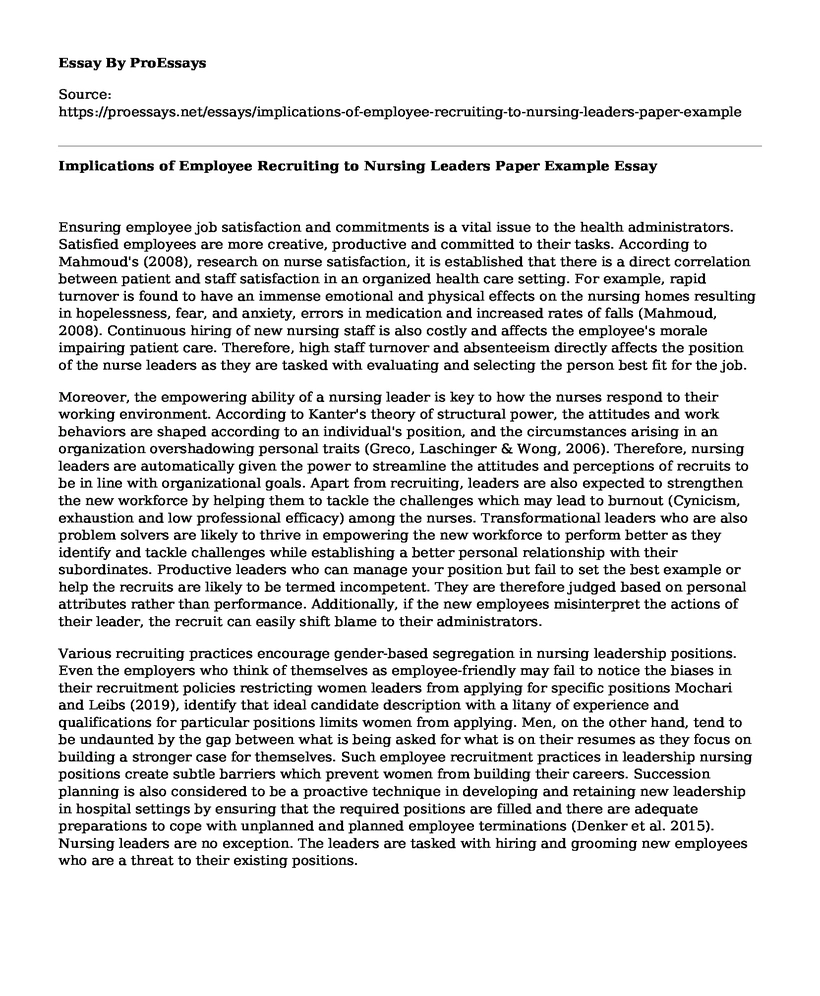Ensuring employee job satisfaction and commitments is a vital issue to the health administrators. Satisfied employees are more creative, productive and committed to their tasks. According to Mahmoud's (2008), research on nurse satisfaction, it is established that there is a direct correlation between patient and staff satisfaction in an organized health care setting. For example, rapid turnover is found to have an immense emotional and physical effects on the nursing homes resulting in hopelessness, fear, and anxiety, errors in medication and increased rates of falls (Mahmoud, 2008). Continuous hiring of new nursing staff is also costly and affects the employee's morale impairing patient care. Therefore, high staff turnover and absenteeism directly affects the position of the nurse leaders as they are tasked with evaluating and selecting the person best fit for the job.
Moreover, the empowering ability of a nursing leader is key to how the nurses respond to their working environment. According to Kanter's theory of structural power, the attitudes and work behaviors are shaped according to an individual's position, and the circumstances arising in an organization overshadowing personal traits (Greco, Laschinger & Wong, 2006). Therefore, nursing leaders are automatically given the power to streamline the attitudes and perceptions of recruits to be in line with organizational goals. Apart from recruiting, leaders are also expected to strengthen the new workforce by helping them to tackle the challenges which may lead to burnout (Cynicism, exhaustion and low professional efficacy) among the nurses. Transformational leaders who are also problem solvers are likely to thrive in empowering the new workforce to perform better as they identify and tackle challenges while establishing a better personal relationship with their subordinates. Productive leaders who can manage your position but fail to set the best example or help the recruits are likely to be termed incompetent. They are therefore judged based on personal attributes rather than performance. Additionally, if the new employees misinterpret the actions of their leader, the recruit can easily shift blame to their administrators.
Various recruiting practices encourage gender-based segregation in nursing leadership positions. Even the employers who think of themselves as employee-friendly may fail to notice the biases in their recruitment policies restricting women leaders from applying for specific positions Mochari and Leibs (2019), identify that ideal candidate description with a litany of experience and qualifications for particular positions limits women from applying. Men, on the other hand, tend to be undaunted by the gap between what is being asked for what is on their resumes as they focus on building a stronger case for themselves. Such employee recruitment practices in leadership nursing positions create subtle barriers which prevent women from building their careers. Succession planning is also considered to be a proactive technique in developing and retaining new leadership in hospital settings by ensuring that the required positions are filled and there are adequate preparations to cope with unplanned and planned employee terminations (Denker et al. 2015). Nursing leaders are no exception. The leaders are tasked with hiring and grooming new employees who are a threat to their existing positions.
Conclusion
Recruitment, accommodation and retaining new workers takes a toll of leaders. The bottom line is that high levels of employee turnover and absenteeism affect the performance of nurses and the morale of patients. In doing so, the competence of leaders responsible for recruitment is questioned. The personal attributes of leaders can also be their greatest achievement or failure as the new staff emulates their actions and even workplace behavior. Recruitment is, therefore, a constant advantage and threat to the positions depending on their ability to remain indispensable.
References
Mahmoud, A. H. (2008). A study of nurses' job satisfaction: the relationship to organizational commitment, perceived organizational support, transactional leadership, transformational leadership, and level of education. European journal of scientific research, 22(2), 286-295. http://www.academia.edu/download/31654526/Mahmoud_AL-_Hussami__RN__2008.pdf
Greco, P., Laschinger, H. K. S., & Wong, C. (2006). Leader empowering behaviors, staff nurse empowerment, and work engagement/burnout.
Nursing Leadership, 19(4), 41-56. https://www.researchgate.net/profile/Heather_Laschinger/publication/6538180_Leader_Empowering_Behaviours_Staff_Nurse_Empowerment_and_Work_EngagementBurnout/links/0912f50aae6a2f18c3000000/Leader-Empowering-Behaviours-Staff-Nurse-Empowerment-and-Work-Engagement-Burnout.pdf
Denker, A. L., Sherman, R. O., Hutton-Woodland, M., Brunell, M. L., & Medina, P. (2015). Florida Nurse Leader Survey findings: key leadership competencies, barriers to leadership, and succession planning needs. Journal of Nursing Administration, 45(7/8), 404-410. https://www.researchgate.net/profile/Michael_Hutton-Woodland/publication/279731354_Florida_Nurse_Leader_Survey_Findings/links/59df63530f7e9b2dba8319e8/Florida-Nurse-Leader-Survey-Findings.pdf
Mochari, I. and Leibs, S., (2019). Glass Ceiling Debate: He Said, She Didn't. Inc https://www.inc.com/magazine/201405/scot-liebs-ilan-mochari/women-leadership-confidence-bias.html
Cite this page
Implications of Employee Recruiting to Nursing Leaders Paper Example. (2022, Nov 07). Retrieved from https://proessays.net/essays/implications-of-employee-recruiting-to-nursing-leaders-paper-example
If you are the original author of this essay and no longer wish to have it published on the ProEssays website, please click below to request its removal:
- Nursing Informatics Quality Improvement Plan - Essay Example
- Impacts of Collective Bargaining Agreement to the Public Essay
- Paper Example on Operations Forecasting
- Ensuring Workplace Health & Safety: Law Protects Employees & Minimizes Risk
- Essay Example on Securing Privacy: Protecting Personal Data & Rights
- Research Paper on Mycoplasma Pneumonia: Atypical Bacteria Causing Mild Pneumonia
- Joining OCS Cover Letter: Achieving My Dream of Becoming a Warranty Officer







